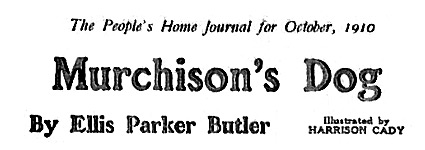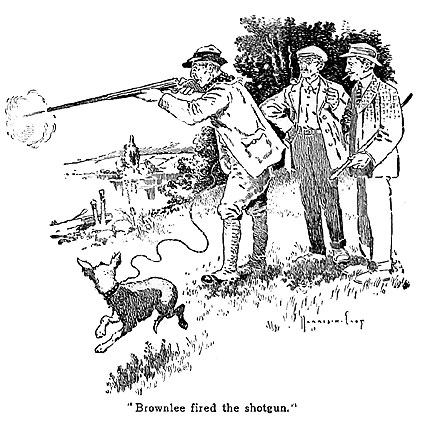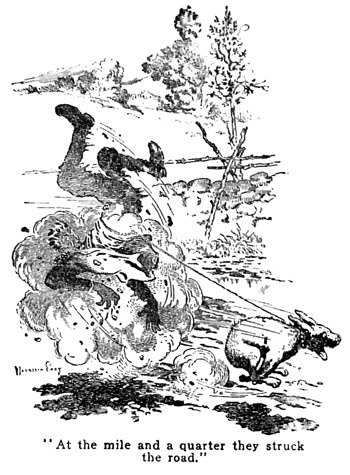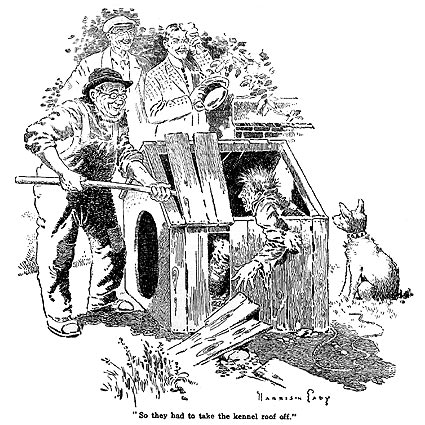from People's Home Journal
Murchison's Dog
by Ellis Parker Butler
Murchison, who lives next door to me, wants to get rid of a dog, and if you know of any one who wants a dog I wish you would let Murchison know. Murchison doesn't need it. He is tired of dogs, anyway. That is just like Murchison. 'Way up in an enthusiasm one day and sick of it the next.

Brownlee -- Brownlee lives on the other side of Murchison -- remembers when Murchison got the dog. It was the queerest thing, so Murchison says, you ever heard of. Here came the express wagon -- Adams Express Company's wagon -- and delivered the dog. The name was all right -- "C. P. Murchison, Gallatin, Iowa," and the charges were paid. The charges were $2.80, and paid, and the dog had been shipped from New York. Think of that! Twelve hundred miles in a box, with a can of condensed milk tied to the box and "Please feed" written on it.
When Murchison came home to dinner there was the dog. At first Murchison was pleased; then he was surprised; then he was worried.
He hadn't ordered a dog. The more he thought about it the more he worried.
"If I could just think who sent it," he said to Brownlee, "then I would know who sent it; but I can't think. It is evidently a valuable dog. I can see that. People don't send cheap, inferior dogs 1,200 miles. But I can't think who sent it."
"What worries me," he said to Brownlee another time, "is who sent it. I can't imagine who would send me a dog from New York. I know so many people, and, like as not, some influential friend of mine has meant to make me a nice present and now he is probably mad because I haven't acknowledged it. I'd like to know what he thinks of me about now!"
It almost worried him sick. Murchison never did care for dogs, but when a man is presented with a valuable dog, all the way from New York, with $2.80 charges paid, he simply has to admire that dog. So Murchison got into the habit of admiring the dog, and so did Mrs. Murchison. From what they tell me it was rather a nice dog in its infancy, for it was only a pup then. Infant dogs have a habit of being pups.
As near as I could gather from what Murchison and Mrs. Murchison told me it was a little, fluffy, yellow ball, with bright eyes and ever-moving tail. It was the kind of dog that bounces around like a rubber ball, and eats the evening newspaper, and rolls down the porch steps with short, little squawks of surprise, and lies down on its back with its four legs in the air whenever a bigger dog comes near. In color it was something like a camel, but a little redder where the hair was long, and its hair was like beaver fur -- soft and woolly inside with a few long hairs that were not so soft. It was so little and fluffy that Mrs. Murchison called it Fluff. Pretty name for a soft little dog is Fluff.
"If I only knew who sent that dog," Murchison used to say to Brownlee, "I would like to make some return. I'd send him a barrel of my best melons, express paid, if it cost me five dollars!"
Murchison was in the produce business, and he knew all about melons, but not so much about dogs. Of course he could tell a dog from a cat, and a few things of that sort, but Brownlee was the real dog man. Brownlee had two Irish pointers or setters -- I forget which they were; the black dogs with the long, flappy ears. I don't know much about dogs myself. I hate dogs.
Brownlee knows a great deal about dogs. He isn't one of the book-taught sort; he knows dogs by instinct. As soon as he sees a dog he can make a guess at its breed, and out our way that is a pretty good test, for Gallatin dogs are rather cosmopolitan. That is what makes good stock in men -- Scotch grandmother and German grandfather on one side, and English grandmother and Swedish grandfather on the other -- and I don't see why the same isn't true of dogs. There are numbers of dogs in Gallatin that can trace their ancestry through nearly every breed of dog that ever lived, and Brownlee can look at any one of them and immediately guess at its formula -- one part Spitz, three parts greyhound, two parts collie and so on. I have heard him guess more kinds of dog than I ever knew existed.
As soon as he saw Murchison's dog he guessed it was a pure bred shepherd with a trace of Eskimo. Massett, who thinks he knows as much about dogs as Brownlee does, didn't believe it. The moment he saw the pup he said it was a pedigree dog, half St. Bernard and half Spitz.
Brownlee and Massett used to sit on Murchison's steps after supper and point out the proofs to each other. They would argue for hours.
"All right, Massett," Brownlee would say, "but you can't fool me! Look at that nose! If that isn't a shepherd nose I'll eat it! And see that tail! Did you ever see a tail like that on a Spitz? That is an Eskimo tail as sure as I am a foot high."
"Tail fiddlesticks!" Massett would reply. "You can't tell anything by a pup's tail. Look at his ears! There is St. Bernard for you! And see his lower jaw. Isn't that Spitz? I'll leave it to Murchison. Isn't that lower jaw Spitz, Murchison?"
Then all three would tackle the pup and open its mouth and feel its jaw, and the pup would wriggle and squeak, and back away, opening and shutting its mouth to see if its works had been damaged.
"All right!" Brownlee would say, "you wait a year or two and you'll see!"
About three months later the pup was as big as an ordinary full grown dog, and his coat looked like a compromise between a calf skin and one of these hair brush door mats you use to wipe your feet on in muddy weather. He did not look like the same pup. He was long-limbed and awkward and useless and homely as a shopworn fifty-cent yellow plush manicure set. Murchison began to feel that he didn't really need a dog, but Brownlee was as enthusiastic as ever. He would go over to Murchison's fairly oozing dog knowledge.
"I'll tell you what that dog is," he would say. "That dog is a cross between a Great Dane and an English deerhound. You've got a very valuable dog there, Murchison, a very valuable dog. He comes of fine stock on both sides and it is a cross you don't often see. I never saw it, and I've seen all kinds of crossed dogs."
Then Massett would drop in and walk around the dog admiringly for a few minutes and absorb his beauties.
"Murchison," he would say, "do you know what that dog is? That dog is a pure cross between a Siberian wolfhound and a Newfoundland. You treat that dog right and you'll have a fortune in him. Why, a pure Siberian wolfhound is worth a thousand dollars, and a good -- a really good Newfoundland, mind you -- is worth two thousand, and you've got both in one dog. That's three thousand dollars' worth of dog!"
In the next six months Fluff grew. He broadened out and lengthened and heightened, and every day or two Brownlee or Massett would discover a new strain of dog in him. They pointed out to Murchison all the marks by which he could tell the different kinds of dog that were combined in Fluff, and every time they discovered a new one they held a sort of jubilee, and bragged and swelled their chests. They seemed to spend all their time thinking up odd and strange kinds of dog that Fluff had in him. Brownlee discovered the traces of Cuban bloodhound, Kamtchatka hound, beagle, Brague de Bengale and Thibet mastiff, but Massett first traced the staghound, Turkoman watchdog, dachshund and harrier in him.
Murchison, not being a doggish man, never claimed to have noticed any of these family resemblances, and never said what he thought the dog really was, until a month or two later, when he gave it as his opinion that the dog was a cross between a wolf, a Shetland pony and a hyena. It was about that time that Fluff had to be chained. He had begun to eat other dogs, and children and chickens. The first night Murchison chained him to his kennel Fluff walked a half a mile, taking the kennel along, and then only stopped because the kennel got tangled with a lamppost. The man who brought him home claimed that Fluff was nearly asphyxiated when he found him; said he gnawed half through the lamppost and that gas got in his lungs, but this was not true. Murchison learned afterward that it was only a gasolene lamppost and a wooden one.
"If there were only some stags around this part of the country," said Massett, "the stag hound strain in that dog would be mighty valuable. You could rent him out to everybody who wanted to go stag hunting, and you'd have a regular monopoly, because he's the only staghound in this part of the country. And stag hunting would be popular, too, out here, because there are no game laws that interfere with stag hunting in this state. There is no closed season. People could hunt stags all the year round, and you'd have that dog busy every day of the year."
"Yes," sneered Brownlee, "only there are no stags. And he hasn't any staghound blood in him. Pity there are no dachs in this state, too, isn't it? Then Murchison could hire his dog at night, too. They hunt dachs at night, don't they, Massett? Only there is no dachshund blood in him either. If there was and if there were a few dachs --"
Massett was mad.
"Yes!" he cried. "And you, with your Cuban bloodhound strain! I suppose if it was the open season for Cubans you'd go out with the dog and tree a few! Or put on snow shoes and follow the Kamtchat to his icy lair!"
Brownlee doesn't get mad easily.
"Murchison," he said, "leaving out Massett's dreary nonsense about staghounds, I can tell you that dog would make the finest duck dog in the state, he's got all the points for a good duck dog, and I ought to know, for I have two of the best duck dogs that ever lived. All he needs is training. If you will train him right you'll have a mighty valuable dog."
"But I don't hunt ducks," said Murchison, "and I don't know how to train even a lap dog."
"You let me attend to his education," said Brownlee. "I just want to show Massett here that I know a dog when I see one. I'll show Massett the finest duck dog he ever saw when I get through with Fluff."

So he went over and got his shotgun, just to give Fluff his first lesson. The first thing a duck dog must learn is not to be afraid of a gun, and Brownlee said that if a dog first learned about guns right at his home he was not so apt to be afraid of them. He said that if a dog heard a gun for the first time when he was away from home and in strange surroundings he was quite right to be surprised and startled, but if he heard it in the bosom of his family, with all his friends calmly seated about, he would think it was a natural thing and accept it as such.
So Brownlee put a shell in his gun and Massett and Murchison sat on the porch steps and pretended to be uninterested and normal, and Brownlee stood up and aimed the gun in the air. Fluff was eating a bone, but Brownlee spoke to him and he looked up, and Brownlee pulled the trigger. It seemed about five minutes before Fluff struck the ground, he jumped so high when the gun was fired, and then he started north by northeast at about sixty miles an hour. He came back all right, three weeks later, but his tail was still between his legs.
Brownlee didn't feel the least discouraged. He said he saw now that the whole principle of what he had done was wrong; that no dog with any brains whatever could be anything but frightened to hear a gun shot off right in the bosom of his family. That was no place to fire a gun. He said Fluff evidently thought the whole lot of us were crazy, and ran in fear of his life, thinking we were insane and might shoot him next. He said the thing to do was to take the shotgun into its natural surroundings and let Fluff learn to love it there. He pictured Fluff enjoying the sound of the gun when he heard it at the edge of the lake.
Murchison never hunted ducks, but as Fluff was his dog he went with Brownlee, and of course Massett went. Massett wanted to see the failure. He said he wished stags were as plentiful as ducks and he would show Brownlee!
Fluff was a strong dog -- he seemed to have a strain of ox in him, so far as strength went -- and as long as he saw the gun he insisted that he would stay at home, but when Brownlee wrapped the gun in brown paper so it looked like a big parcel from the meat shop, the horse that they had hitched to the buckboard was able to drag Fluff along without straining itself. Fluff was fastened to the rear axle with a chain.
When they reached Duck Lake, Brownlee untied Fluff and patted him, and then unwrapped the gun. Fluff gave one pained glance and made the six mile run home in seven minutes without stopping. He was home before Brownlee could think of anything to say, and he went so far into his kennel that Murchison had to take off the boards at the back to find him that night.
"That's nothing," was what Brownlee said when he did speak; "young dogs are often that way. Gun fright. They have to be gun broken. You come out tomorrow, and I'll show you how a man who really knows how to handle a dog does the trick."
The next day when Fluff saw the buckboard he went into his kennel and they couldn't pry him out with the hoe-handle. He connected buckboards and guns in his mind, so Brownlee borrowed the butcher's delivery wagon and they drove to Wild Lake. It was seven miles, but Fluff seemed more willing to go in that direction than toward Duck Lake. He did not seem to care to go to Duck Lake at all.
"Now, then," said Brownlee. "I'll show you the intelligent way to handle a dog. I'll prove to him that he has nothing to fear, that I am his comrade and friend. And at the same time," he said, "I'll not have him running off home and spoiling our day's sport."
So he took the chain and fastened it around his waist, and then he sat down and talked to Fluff like an old friend, and got him in a playful mood. Then he had Murchison get the gun out of the wagon and lay it on the ground about twenty feet off. It was wrapped in brown paper.
Brownlee talked to Fluff and told him what fine sport duck hunting is, and then, as if by chance, he got on his hands and knees and crawled toward the gun. Fluff hung back a little, but the chain just coaxed him a little, too, and they edged up to the gun, and Brownlee pretended to discover it unexpectedly.
"Well! Well!" he said, "What's this?"
Fluff nosed up to it and sniffed it, and then went at it as if it was Massett's cat. Brownlee had wrapped a beefsteak around the gun, inside the paper, and Fluff tore off the paper and ate the steak, and Brownlee winked at Murchison.
"I declare," he said, "if here isn't a gun! Look at this, Fluff, a gun! Gosh! but we are in luck!"
Would you believe it, that dog sniffed at the gun and did not fear it in the least? You could have hit him on the head with it and he would not have minded it. He never did mind being hit with small things like guns and ax handles.
Brownlee got up and stood erect.
"You see!" he said, proudly. "All a man needs with a dog like this is intelligence. A dog is like a horse. He wants his reason appealed to. Now, if I fire the gun he may be a little startled, but I have created a faith in me in him. He knows there is nothing dangerous in a gun as a gun. He knows I am not afraid of it, so he is not afraid. He realizes that we are chained together, and that proves to him that he need not run unless I run. Now watch."
Brownlee fired the shotgun.

Instantly he started for home. He did not start lazily, like a boy starting to the woodpile, but went promptly and with a dash. His first jump was only ten feet, and we heard him grunt as he landed, but after that he got into his stride and made fourteen feet each jump. He was bent forward a good deal in the middle, where the chain was, and in many ways he was not as graceful as a professional cinder-path track runner; but in running the main thing is to cover the ground rapidly. Brownlee did that.
Massett said it was a bad start. He said it was all right to start a hundred-yard dash that way, but for a long-distance run -- a run of seven miles across country -- the start was too impetuous; that it showed a lack of generalship, and that when it came to the finish the affair would be tame; but it wasn't.
Brownlee said afterward that there wasn't a tame moment in the entire seven miles. It was rather more wild than tame. He felt right from the start that the finish would be sensational, unless the chain cut him quite in two, and it didn't. He said that when the chain had cut as far as his spinal column it could go no further, and it stopped and clung there, but it was the only thing that did stop, except his breath. It was several years later that I first met Brownlee and he was still breathing hard, like a man who has just been running rapidly. Brownlee says when he shuts his eyes his legs still seem to be going.
The first mile was through underbrush, and that was lucky, for the underbrush removed most of Brownlee's clothing, and put him in better running weight, but at the mile and a quarter they struck the road. He said at two miles he thought he might be over exercising the dog and maybe he had better stop, but the dog seemed anxious to get home, so he didn't stop there. He said that at three miles he was sure the dog was overdoing, and that with his knowledge of dogs he was perfectly able to stop a running dog in its own length if he could speak to it, but he couldn't speak to this dog for two reasons. One was that he couldn't overtake the dog and the other was that all the speak was yanked out of him.
When they reached five miles the dog seemed to think they were taking too much time to get home, and let put a few more laps of speed, and it was right there that Brownlee decided that Fluff had some greyhound blood in him.
He said that when they reached town he felt as if he would have been glad to stop at his own house and lie down for a while, but the dog didn't want to, and so they went on, but that he ought to be thankful that the dog was willing to stop at that town at all. The next town was twelve miles further on, and the roads were bad. But the dog turned into Murchison's yard and went right into his kennel.
When Murchison and Massett got home an hour or so later, after driving the horse all the way at a gallop, they found old Gregg, the carpenter, prying the roof off the kennel. You see, Murchison had knocked the rear out of the kennel the day before, and so when the dog aimed for the front he went straight through and, as Brownlee was built more perpendicular than the dog, Brownlee didn't go quite through. He went in, something like doubling up a dollar bill to put it into a thimble. I don't suppose anyone would want to double up a dollar bill to put it into a thimble, but neither did Brownlee want to be doubled up and put into the kennel. It was the dog's thought. So they had to take the kennel roof off.
When they got Brownlee out they laid him on the grass and covered him up with a porch rug and let him lie there a couple of hours to pant, for that seemed what he wanted to do just then. It was the longest period Brownlee ever spent awake without talking about dog.

Murchison and Massett and old Gregg and twenty-six informal guests stood around and gazed at Brownlee panting. Presently Brownlee was able to gasp out a few words.
"Murchison," he gasped. "Murchison, if you just had that dog in Florence -- or wherever it is they race dogs -- you'd have a fortune."
He panted a while and then gasped out:
"He's a great runner; a phenomenal runner!"
He had to pant more and then he gasped with pride:
"But I wasn't three feet behind him all the way!"